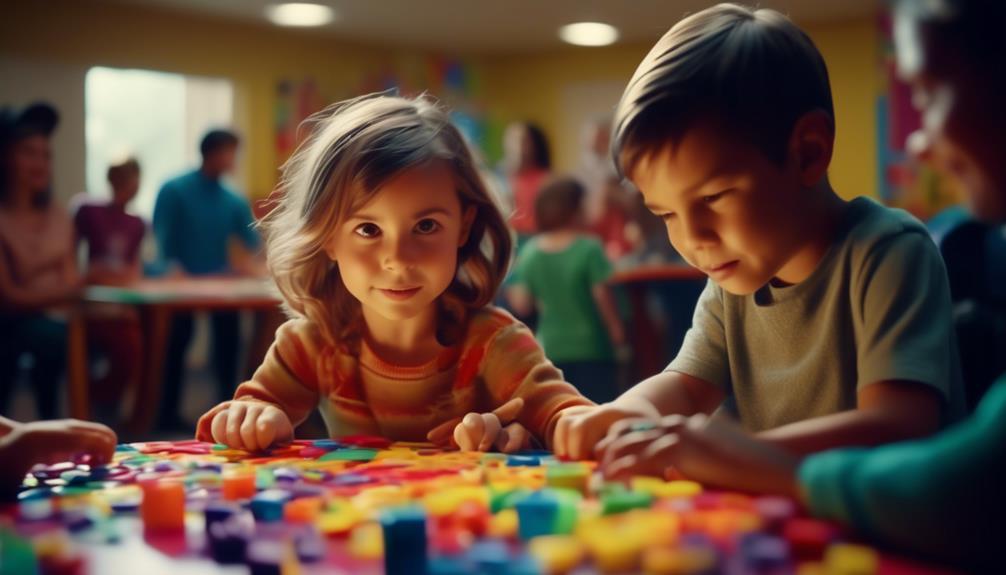The Importance of Parental Involvement in Early Education

Parental involvement in early education is crucial for a child's academic, social, and emotional development. It has been shown to lead to improved behavior, discipline, and stronger peer relationships.
When parents are actively involved in their child's education, they can provide support and guidance that extends beyond the classroom. They can help with homework, read with their child, and engage in educational activities that reinforce what is being taught at school. This kind of involvement fosters a love for learning and helps children see the value of education.
In addition to academic benefits, parental involvement also has a positive impact on a child's social and emotional development. When parents are present and engaged, children feel more secure and have a greater sense of belonging. This can lead to improved self-esteem and confidence, as well as better social skills.
Furthermore, parental involvement helps to instill discipline and positive behavior in children. When parents set clear expectations and reinforce them at home, children are more likely to exhibit good behavior both in and out of school. They also learn important life skills, such as responsibility and self-control.
Stronger peer relationships are another important outcome of parental involvement. When parents are involved in their child's education, they often have opportunities to interact with other parents and participate in school activities. This can lead to the formation of supportive networks and friendships among families, which can benefit children by providing a sense of community and promoting positive social interactions.
In conclusion, parental involvement in early education is crucial for a child's overall development. It not only improves academic performance but also contributes to social and emotional growth, behavior, discipline, and the formation of stronger peer relationships. Parents play a vital role in their child's education, and their involvement has long-lasting benefits that extend far beyond the classroom.
Key Takeaways
- Parental involvement in early education has numerous academic benefits, such as higher test scores, better grades, increased likelihood of high school graduation, and greater likelihood of pursuing higher education.
- Involvement from parents also plays a crucial role in social and emotional development, including building resilience, promoting empathy, developing meaningful relationships, fostering a sense of community, and cultivating kindness.
- Improved behavior and discipline are also outcomes of parental involvement, achieved through positive behavior reinforcement, setting clear expectations, consistency in discipline, understanding consequences, and creating a supportive learning environment.
- To promote parental involvement, techniques such as praise and recognition, rewards and incentives, consistency and clear expectations, reinforcing positive choices, and nurturing a supportive learning environment can be utilized.
Academic Benefits of Parental Involvement
When parents actively participate in their child's early education, they not only strengthen the parent-child bond but also enhance their child's academic performance. Research has consistently shown that parental involvement has a significant positive impact on academic performance. Children whose parents are actively engaged in their education tend to have higher test scores, better grades, and are more likely to graduate from high school and pursue higher education.
One of the reasons for this academic benefit is that parental involvement promotes a positive learning environment at home. When parents show interest in their child's education, it sends a powerful message that education is important and valued. This can motivate children to take their studies seriously and strive for academic success.
Additionally, parental involvement allows parents to provide support and guidance to their children, helping them with homework, projects, and other academic tasks. This support can greatly contribute to a child's cognitive development and overall academic growth.
Furthermore, parental involvement fosters a sense of accountability and responsibility in children. When parents are actively involved, children understand that their education matters and that they're expected to perform well academically. This sense of accountability can drive children to set high standards for themselves and work hard to achieve their academic goals.
Social and Emotional Development
Parental involvement plays a crucial role in fostering social and emotional development in children. As a parent, you have the power to shape your child's ability to build resilience and promote empathy.
Building resilience is important because it helps children bounce back from adversity and face challenges with confidence. When you're actively involved in your child's life, you can provide them with the support and encouragement they need to develop resilience. By teaching them how to overcome obstacles and persevere, you're equipping them with a valuable life skill.
Promoting empathy is equally important, as it allows children to understand and share the feelings of others. When you engage with your child, you have the opportunity to model empathy in your interactions. By showing understanding and compassion, you're teaching your child how to connect with and care for others.
This not only helps them develop meaningful relationships, but it also fosters a sense of community and kindness.
Improved Behavior and Discipline
When it comes to improving behavior and discipline in early education, positive behavior reinforcement is key. By acknowledging and rewarding good behavior, parents can motivate their children to continue behaving well.
Additionally, setting clear expectations for behavior helps children understand what's expected of them, reducing confusion and potential misbehavior.
Lastly, consistency in discipline is crucial. When parents enforce consequences consistently, children learn that their actions have consequences, leading to improved behavior and discipline.
Positive Behavior Reinforcement
By implementing positive behavior reinforcement techniques, you can effectively improve your child's behavior and discipline while fostering a healthy and supportive learning environment. Positive reinforcement involves acknowledging and rewarding good behavior, which encourages your child to continue exhibiting positive actions.
Here are three key ways to implement positive behavior reinforcement:
- Praise and recognition: When your child demonstrates good behavior, such as sharing or using manners, praise their efforts and acknowledge their positive actions. This reinforces their behavior and encourages them to continue behaving in a similar manner.
- Rewards and incentives: Offering rewards or incentives, such as stickers or small treats, can motivate your child to exhibit positive behavior consistently. This helps them understand the value of good behavior and encourages them to make positive choices.
- Consistency and clear expectations: Set clear expectations for your child's behavior and consistently reinforce these expectations. By providing a structured and predictable environment, your child will understand what's expected of them and be more likely to exhibit positive behavior.
Implementing positive behavior reinforcement techniques can lead to improved behavior and discipline in your child, creating a nurturing and supportive learning environment for their overall development.
Clear Expectations Set
To ensure improved behavior and discipline in your child, it's crucial to establish clear expectations that provide structure and guidance in their development. Clear expectations set the tone for behavior and help children understand what's expected of them.
When expectations are communicated effectively, children feel more secure and are more likely to follow the rules. Start by defining the specific behaviors you want to see from your child and explain why they're important. Use simple and concise language to make it easier for your child to understand.
Be consistent in enforcing these expectations and provide positive reinforcement when your child meets them. Effective communication and consistency are key to establishing clear expectations that lead to improved behavior and discipline in your child.
Consistent Discipline Approach
Establishing a consistent discipline approach is essential for fostering improved behavior and discipline in your child. Consistency provides a sense of predictability and stability, allowing children to understand boundaries and expectations. Here are three reasons why a consistent discipline approach is crucial for effective parenting:
- Clear guidelines: Consistent discipline ensures that your child knows what behaviors are acceptable and what're not. By setting and enforcing clear guidelines, you provide your child with a framework for understanding right from wrong.
- Emotional stability: Consistency in discipline helps create a secure and emotionally stable environment for your child. Knowing the consequences of their actions gives them a sense of control and helps them develop emotional regulation skills.
- Positive role modeling: Consistent discipline allows you to be a positive role model for your child. When you consistently follow through with consequences, you teach them the importance of responsibility and accountability.
Stronger Peer Relationships
Developing strong peer relationships is crucial for children's social and emotional development as they navigate through their early education journey. Improved communication and healthy friendships play a vital role in shaping their overall well-being.
When children interact with their peers, they learn essential social skills such as cooperation, empathy, and problem-solving. These skills are crucial for their future success, as they allow them to form meaningful connections, work collaboratively, and navigate conflicts effectively. By engaging in positive peer relationships, children develop a sense of belonging and gain confidence in their ability to interact with others.
Parental involvement in fostering stronger peer relationships is paramount. As a parent, you can encourage your child to engage in social activities, such as playdates or extracurricular clubs, where they can interact with their peers in a safe and supportive environment. By providing opportunities for socialization, you're helping your child develop the necessary skills to establish and maintain healthy friendships.
It is also essential to model positive social behavior and teach your child effective communication strategies. Encourage them to express their feelings and thoughts openly and respectfully, while also teaching them to listen actively and empathetically. By doing so, you're equipping your child with the tools they need to navigate social situations confidently.
Enhanced Teacher-Parent Collaboration
As a parent, your involvement in fostering stronger peer relationships is crucial for your child's social and emotional development. However, it's not just your child's relationships with their peers that require attention; your collaboration with their teacher is equally important. Effective teacher-parent communication and collaboration can greatly enhance your child's educational experience.
Here are three reasons why enhanced teacher-parent collaboration is vital:
- Improved Understanding: When teachers and parents work together, they gain a deeper understanding of the child's needs and strengths. By sharing insights and observations, you can provide valuable information that helps the teacher tailor their approach to better support your child's learning and development.
- Consistency and Reinforcement: Collaborating with your child's teacher allows for consistency between home and school environments. By aligning strategies and expectations, you create a supportive and reinforcing atmosphere that benefits your child's progress. This collaboration also helps address any concerns or challenges early on, preventing them from escalating.
- Holistic Development: Teachers and parents have different perspectives and expertise. When they come together, they can create a holistic approach to education. By combining their knowledge and resources, they can address academic, social, and emotional aspects of your child's development, ensuring a well-rounded education.
Enhanced teacher-parent collaboration is the key to unlocking your child's full potential. By working together, you can create a supportive and enriching environment that promotes their growth and success.
Practical Strategies for Parental Involvement
Are you looking for practical ways to get involved in your child's early education?
Communication with teachers is key, as it allows you to stay informed about your child's progress and any areas that may need extra attention.
Engaging in learning activities at home not only reinforces what your child is learning in the classroom, but also strengthens the bond between you and your child.
Lastly, supporting your child's academic progress by providing a conducive learning environment and assisting with homework can make a significant difference in their educational journey.
Communication With Teachers
To effectively foster parental involvement in early education, it's essential to establish open and regular communication with your child's teachers. Building a strong teacher-parent partnership is crucial for your child's educational journey.
Here are three practical strategies to enhance communication with teachers:
- Attend parent-teacher conferences: These meetings provide an opportunity to discuss your child's progress, strengths, and areas for improvement. It allows you to gain valuable insights from the teacher and share any concerns or suggestions.
- Utilize communication channels: Stay connected with your child's teachers through emails, phone calls, or messaging apps. Regularly check for updates, assignments, and important announcements. This ensures you're well-informed about your child's learning activities and can address any queries promptly.
- Schedule face-to-face meetings: Arrange meetings with teachers to discuss any specific concerns or to gain a comprehensive understanding of your child's educational experience. Face-to-face interactions foster a deeper connection and allow for more personalized communication.
Engaging in Learning Activities
Engaging in learning activities with your child is a vital aspect of parental involvement in their early education. By actively participating in their learning, you can provide them with valuable support and help them develop important skills.
There are various learning strategies that you can use to make the experience interactive and enjoyable for both of you. For example, you can play educational games that promote critical thinking and problem-solving.
You can also read together, asking questions and discussing the story to enhance comprehension. Additionally, hands-on activities such as science experiments or art projects can stimulate creativity and curiosity.
By engaging in these learning activities, you aren't only fostering your child's educational growth but also creating lasting memories and strengthening your bond.
Supporting Academic Progress
By actively supporting your child's academic progress, you can play a crucial role in enhancing their educational journey and setting them up for future success. Here are three practical strategies for providing academic support and promoting educational engagement:
- Establish a consistent homework routine:
Set aside a specific time and place for your child to complete their homework. Offer guidance and assistance when needed, but also encourage them to take ownership of their learning.
- Communicate with teachers:
Stay in regular contact with your child's teachers to stay updated on their progress and any areas that may need improvement. Attend parent-teacher conferences and ask questions to gain a deeper understanding of their academic strengths and weaknesses.
- Encourage a love for reading:
Make reading a daily habit by setting aside dedicated reading time. Provide a variety of books and encourage your child to choose their own reading material. Discuss their favorite books and ask open-ended questions to foster critical thinking skills.
Long-term Impact on a Child's Education
Active parental involvement in a child's early education sets the foundation for their long-term academic success. The impact of parental involvement on a child's education extends far beyond their early years. Research shows that children who have parents actively involved in their education are more likely to achieve higher educational outcomes and have better long-term effects on their overall development.
To illustrate the long-term impact of parental involvement, let's take a look at the following table:
| Long-term Effects of Parental Involvement |
|---|
| Improved academic performance |
| Higher graduation rates |
| Increased college enrollment |
| Better job prospects |
| Enhanced socio-emotional development |
These outcomes highlight the significance of parental involvement in shaping a child's future. When parents actively engage in their child's education, they create a supportive environment that fosters a love for learning, encourages academic achievement, and instills valuable life skills.
Frequently Asked Questions
How Can Parental Involvement in Early Education Positively Impact a Child's Future Career Prospects?
Imagine a child's future as a garden blooming with opportunities. When parents actively engage in their early education, they nurture the seeds of positive long term outcomes, cultivating career readiness that will flourish throughout their lives.
What Are Some Common Challenges That Parents May Face When Trying to Be Involved in Their Child's Education?
Challenges you may face when trying to be involved in your child's education include time constraints, lack of resources, and communication barriers. Strategies such as setting a schedule, seeking support, and utilizing technology can help overcome these challenges.
How Does Parental Involvement in Early Education Contribute to a Child's Overall Well-Being and Happiness?
Parental involvement in early education greatly contributes to your child's overall well-being and happiness. By actively participating in their education, you foster a strong parent-child bond and positively impact their academic progress.
Can Parental Involvement in Early Education Help Prevent or Address Learning Disabilities or Developmental Delays?
By actively participating in your child's early education, you can help prevent learning disabilities and address developmental delays. Your involvement plays a crucial role in ensuring their success and overall well-being.
What Are Some Effective Ways for Parents to Maintain Their Involvement in Their Child's Education as They Transition to Higher Grade Levels?
As your child transitions to higher grade levels, it's important to maintain your involvement in their education. By staying engaged, supporting their learning, and communicating with teachers, you can continue to make a positive impact on their academic journey.











